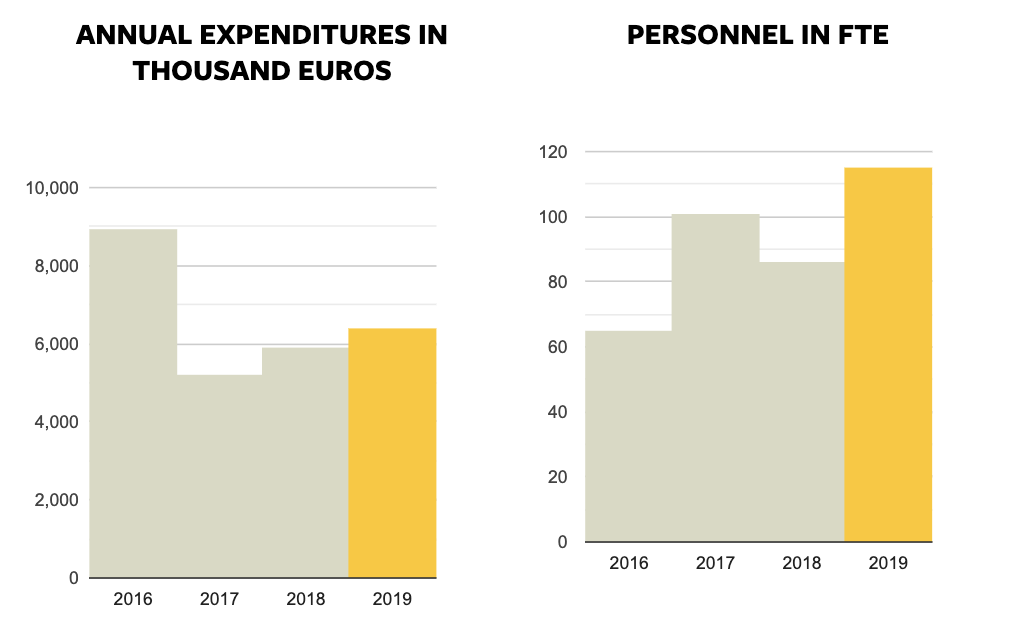REGIONAL COMMODITY PROGRAMMES
COCOA
Our partnership with bean-to-bar producer Casa Lasevicius increased demand for premium cocoa from the area, retailing at triple the price of standard cocoa. In 2019, three tonness of the cocoa were sold at an average price of 25 Brazilian reals (5 euros) per kg, generating a gross income of 75,000 reals (15,000 euros) for eight producers in the project.

COFFEE
Café del Futuro (Coffee of the Future), the second stage of Solidaridad’s joint strategy with Norway’s International Climate Forests Initiative, was officially launched in Colombia and Peru. The project has already supported 1,880 coffee growers, and directly managed 5,844 hectares using climate-smart practices at the end, as well as the planting of over 20,000 trees. The first circular economy coffee supply chain between Peru and the Netherlands was launched in partnership with Olam and Jacobs Douwe Egberts.

COTTON
Cotton producers in Brazil increased their profits by 18% despite poor rainfall patterns and lower farm gate values for cotton. Strengthening of local cooperative Coopercat led to an increase of about 10% in the number of smallholder producers supported through technical assistance, collective purchasing of inputs and collective sales of cotton lint. The processing volume of 630 tonnes of cotton lint was the same as in 2018.

FRUIT & VEGETABLES
We coordinated with the Peruvian Banana Cluster and the country’s National Food Safety and Quality Service to develop a strategy to prevent an outbreak of a disease affecting the fruit. This positively impacted 8,500 smallholders that depend on banana exports for a living. In Brazil, we facilitated a pre-competitive citrus programme to improve the competitiveness of almost 10% of the orange producers in the Brazilian citrus belt.

GOLD
A leading gold mining company in Peru was the first of 18 large companies to co-fund the formalization process of Pepas de Oro, an artisanal small-scale miners organisation. As a result, 266 artisanal scale miners improved their health and safety conditions. Since 2016, Solidaridad South America has supported the production of 1,125 kg of gold using responsible practices.

LIVESTOCK
Dairy farmers in Paraguay reduced greenhouse gas emissions per litre of milk by 62% while increasing productivity by 17% as part of our cattle programme. At the same time, beef farmers managed 15,000 hectares (+311% of the target) using climate-smart techniques, while increasing beef volumes by 60%. In Colombia, Solidaridad signed a milestone agreement with the Ministry of Environment and private sector partners to reduce beef and dairy-related deforestation by 2030.

PALM OIL
We signed three important partnerships in 2019. The first, with the Colombian palm oil growers federation and the country’s Ministry of Environment, aims for 75% of palm oil to be produced using sustainable methods by 2023. The second, with the RSPO, brings its new Smallholder Academy to Latin America. And the third, with Peru’s largest consumer goods company, means we will assess sustainability gaps in its supply chain, mainly made up of smallholder-owned mills.

SOY
In Paraguay, the MejorAgro project contributed to more sustainable management of 6,129 hectares (+122% of the target), which yielded 21,513 tons of soybeans (+170%). Over 1,594 new producers joined training sessions. The UN Global Compact recognized the project’s use of digital technology, real-time analysis of farming practices, and continuous improvement. Meanwhile, Paraguay received the National Energy Globe Award for its UniSol project, which contributes to sustainable agriculture and combats deforestation.

SUGARCANE
In Brazil, 45% of the farmers enrolled in our Elo sustainability initiative achieved a level of excellence, implementing more than 80% of the recommended practices. This entitled them to higher prices. Solidaridad engaged with Raízen, Brazil’s leading sugarcane ethanol producer, and the Dutch branch of electric utility RWE to study the potential of sugarcane waste to generate renewable energy. In Colombia, the Fenix programme implemented with producers association Procaña, expanded its user base to 300.

TEA
In Argentina, participants in our sustainable tea initiative produced 15,600 tonnes of green leaves for the US market, 25% more than the original target. Nearly 4,000 hectares were farmed using good agricultural practices, three times the target. A total of 166 producers were trained during the project and 140 of them succeeded in obtaining Rainforest Alliance certification.



